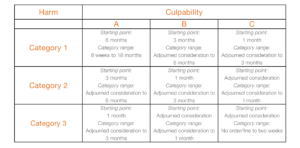Anna Bennett was recently instructed on the case of Issac Smith v Network Homes Limited which was one of the three conjoined appeals heard by the Court of Appeal in November 2022 with judgment being handed down on 16 December 2022. The three cases all concerned appeals against sentences received by residents of social housing who had breached the terms of Injunctions obtained against them further to the Anti-Social Behaviour Crime and Policing Act 2014.
The Court of Appeal took the opportunity to provide guidance to the civil courts when considering committal applications and breach as concerns had been raised by the Civil Justice Council (“CJC”) in a Report dated July 2020 entitled July 2020 entitled Antisocial Behaviour in Civil Courts about inconsistencies in the penalties imposed by judges when considering breach or committal applications.
This will prove helpful for the Courts as prior to this there had not been any guidance set down for Judges in civil cases in how to consider contempt applications as opposed to breaches of criminal injunctions for example, which have a much higher sentence.
The three cases were factually different, Optivo v Hopkins concerned a case where Miss Hopkins had been sentenced to a 28 day custodial sentence suspended on condition she complied with the injunction until April 2023. Ms Hopkins appealed on the grounds that (1) the sentence was immensely excessive and (2) that in sentencing, the Judge took into account irrelevant information or failed to take into account relevant information.
The case of Smith -v- Network Homes Limited, involved an appeal by Mr Smith against a 12 week custodial sentence suspended for 12 months. He had been found to be in breach in respect of 9 of 10 allegations made against him. The grounds in this appeal were (1) that the judgment had not been transcribed and placed on judiciary website at the proper time contrary to CPR rule 81.8 (8); (2) that the Judge had erred in not considering a possession order against the Defendant as an alternative of committal; (3) that the Judge was wrong to determine the committal application without determining whether Mr Smith was eligible for legal aid.
In Wigan Council-v- Lovett, Mr Lovett had been found to be in breach on 177 separate occasions and being committed to prison at least 4 times prior to the most recent finding of breach in July 2022, where he had been sentenced to 30 weeks custody to be served concurrently with a previous custodial sentence. Mr Lovett appealed on whether the judge was correct to fine him in breach and whether he was entitled to challenge the Injunction.
In considering the three appeals, the Court of Appeal highlighted the purposes of sentencing for beach of an Order made under Part I of the Anti-Social Behaviour Crime and Policing Act 2014, being as follows:
- To ensure future compliance with the order
- Punishment
- Rehabilitation
The options that are available to the Court when considering penalties are as follows:
- An immediate order for committal to prison
- A suspended order for committal to prison
- Adjourning the consideration of the penalty
- A fine
- No Order
In terms of custodial sentences for breach of a civil injunction the maximum custodial sentence available would be is 2 years imprisonment.
Suspension of sentences and adjournment consideration of sentencing were also raised as useful tools to amend and impose a variety of conditions which may assist the subject of the Injunction to comply. The Court of Appeal referred to and approved the scheme suggested by the CJC in its report as a valuable tool to use when considering breach and bearing in mind each case will be fact sensitive, for ease we have reproduced the table below.
In the table below culpability differentiates between
- A – serious breach or persistent serious breaches
- B – deliberate breach falling between A and C
- C – minor breach or breaches
Harm is categorised as follows:
- Category 1 – breach causes very serious harm or distress
- Category 2 – Cases falling between 1 and 3
- Category 3 – Breaches cause little or no harm

Essentially, where a breach is extremely harmful or distressing and is also high culpability, a very serious breach or persistent, then it would fall into the top left hand box and the judge should consider immediate imprisonment with a starting point of 6 months but within a range of 8 weeks to 18 months. Note that for the majority other cases, the guidance suggests that sentencing be adjourned for further consideration so that the Court could come back and has a chance to speak to the tenant again.
Applying the sentencing guidance, for the Optivo and Hopkins case, the Court of Appeal allowed the appeal against the sentence and replaced it with no order. For Smith -v- Network Homes, whilst Mr Smith failed on all his grounds for appeal, the Court of Appeal consider the sentence was a little excessive and the sentence was reduced to 1 month custodial sentence for 12 months. In relation to Lovett v Wigan Borough Council– the appeal was dismissed.
What does this mean for Registered Providers?
For Registered Providers (“RPs”) who already have Injunctions in place against tenants under Part I the Anti-Social Behaviour Crime and Policing Act 2014 and where those tenants are continuing to breach those Injunctions, we would advise that applications for committal are brought sooner rather than later. If there is a power of arrest attached then the timing of any committal proceedings may well be taken out of the RPs hands.
For RPs the prime concern will be to encourage those tenants to comply with the terms of the Injunction and if it appears they are not able or willing to do so then to protect other residents, consideration should be given to issuing possession proceedings on the relevant Grounds available to them. If breach is proven then it does allow RPs to pursue proceedings on the mandatory grounds for possession.
For further information, do contact Anna Bennett.
